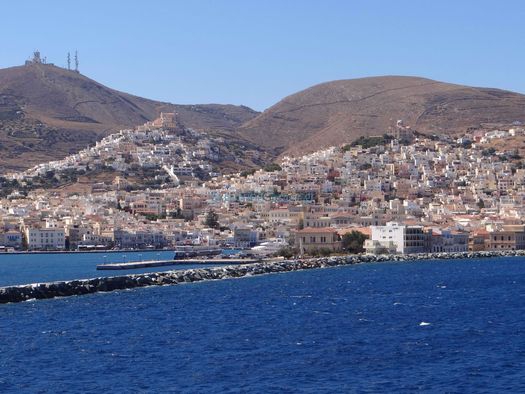One of the largest islands in the South Aegean, Syros (or Siros) impresses visitors with its distinctive character. From the mansions of Hermoupolis and the narrow lanes of Ano Syros to cosmopolitan Poseidonia and the small villages of the interior, the island of Syros reveals magical landscapes, enabling fascinating discoveries.
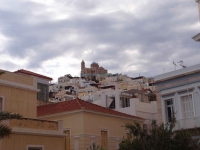
Hermoupolis
The capital of the Cyclades and headquarters for many services, Hermoupolis is fairly large in both size and population. It is not at all a typical Cycladic port. Apart from pragmatic and technical concerns such as size and headquarters, the most impressive feature distinguishing it from the other Cycladic islands is its architecture.
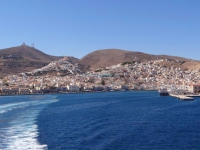
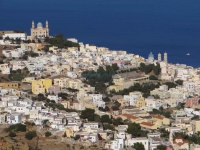
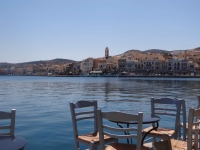
Extending up the hill and onto smaller hills, the city is full of the old mansions of nobles, merchants, and captains. It began to develop in the early 19th century and evolved into a major naval and industrial center for the Greek state. The large port, the dockyard, the Industrial Museum, and of course the mansions testify to the rich history of Hermoupolis. Just behind the coastal road, the labyrinth of narrow streets begins. We see neither detached houses nor apartment buildings or other constructions; we feel that all of Hermoupolis consists of mansions. With most of them restored in a traditional way, with many large windows, high painted ceilings, and colorful doors, they are now home to some fortunate inhabitants.


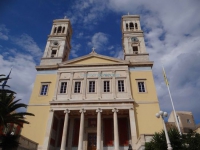
Especially in the Vaporia district, the most famous part of Syros, with its truly impressive mansions, the evening walk becomes a ritual. The small paved streets are generally dark and silent, although the footsteps of couples and the distant laughs of friends dispel the mysterious atmosphere. The mansions cast their shadows, and the yellow light bulbs shine their weak light on stones polished by footsteps. But these are the moods and stories of the night. During the day, Hermoupolis teems with life. Cars squeeze into the narrow streets and climb up the hills, and the beach and cafés fill with people (including many students from the university).
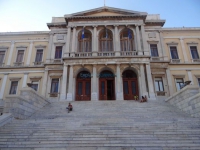

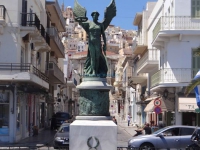
In the enormous Miaouli Square we find the huge Town Hall, one of the largest in Europe. And right behind it is the Apollo Theater, a great asset to the cultural life of Hermoupolis. People come and go, tourists climb and descend the narrow streets, the citizens of the Cycladic islands hurry to the public services, and the locals calmly drink their coffee.
Ano Syros
Ano Syros is an immense balcony with a view, and behind this balcony hide narrow streets, Catholic churches, and gorgeous houses. "Can you manage? Shall we go up on foot? " asks Dimitris, a regular visitor to the island for years. He is referring to Ano Syros, the neighborhood that gazes down on Hermoupolis from above, from the slopes of one of the two hills that welcome you to the harbor. "Let's go," I say, and so the ascent begins. We climb narrow uphill streets for about half an hour, until Ano Syros appears in front of us, perched on a hillside. We lose ourselves in the narrow lanes, visit Catholic churches (since Syros has a large percentage of Catholic believers), and finally come out in open spaces to admire the view.
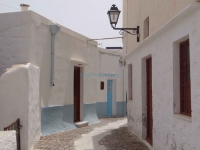
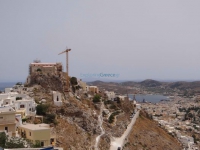

One of the island’s old settlements, Ano Syros was occupied, at different times, by the Turks, the Venetians, and the Russians. The Venetians, who built churches and created an exceptional medieval city, left the clearest evidence of their presence in the settlement. The entire medieval settlement of Ano Syros, along with many ecclesiastical buildings and some secular ones, have been designated preserved historic monuments by the Ministry of Culture. Ano Syros is also associated with the development of rebetiko music in Greece, as the great rebetiko musician Markos Vamvakaris lived here. There is now a Museum that honors him.
Ano Meria
All the settlements located north of Ano Syros are part of the area called Ano Meria of Syros. This is the wild side of the island, as it does not have many large settlements or beaches. The few beaches it has are accessible only by trail or by boat and are considered among the most beautiful on the island. These include Grammata, Gria Spilia, and Marmari. The largest settlement is San Michalis, namesake of the famous San Michalis cheese of Syros. Near the settlements Halandriani and Lygero, there is also the Prehistoric Settlement of Kastri, but it is difficult to reach.

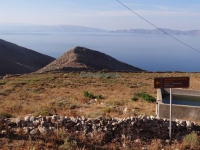
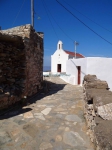
In the rest of Syros, mainly on the south side, the seaside settlements Azolimnos and Vari are noteworthy; farther west is Poseidonia or Dellagratsia, the old resort of wealthy islanders. Nearby are the interesting seaside settlements of Finikas, Megas Gialos, and Galissas. The settlement of Kini has a good beach and fish taverns.
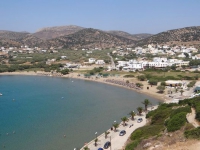
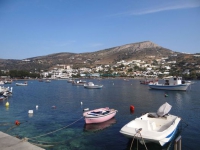
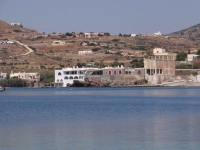
Farther inland, there are also small, scattered villages such as Chrousa, [Episkopio][TID 40668], Pagos, and Parakopi.


